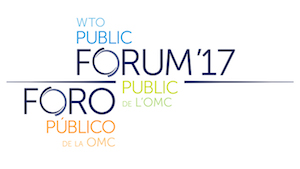Increasing MSME participation in GVCs with digital technology
28 Sep 2017 14:30h - 15:30h
Event report
[Read more session reports from WTO Public Forum 2017]
The moderator Mr Robert Koopman, Chief Economist and Director, Economic Research and Statistics Division, WTO, welcomed everyone by highlighting how the global value chain can potentially help the micro, small and medium-sized enterprises (MSMEs) and how the emerging digital products can shape the process. He finished by introducing the panellists.
Dr Lucian Cernat, Chief Trade Economist, European Commission, pointed out that 90% of exporting companies are MSMEs, and as such, there is a need for applicable international rules and regulations to ensure smooth trade. The key issue for Cernat was that in order to help with the large amount of information, the EU is trying to use a combination of trade policy 2.0 and technology. Additionally, the MSMEs’ ignorance remains a problem, but in order to close the information gap, the EU is trying to provide easy and relevant information to exporters either via tools or tailored information packages. In conclusion, he highlighted how the information from MSMEs could help the EU in future trade negotiations which require companies being able to reach out.
Dr Tarcisio Hardman Reis, Manager, International Air Transport Association (IATA), started by pointing out how digital information helps to coordinate aviation based trade, which is a large part of the global value chain (GVC). IATA is also seeking to increase the importance of aviation based global trade by expanding outside of just high-quality and speed-based products. Hardman Reis said that data can increase the efficiency of air cargo based trade, and that IATA produced a report which shows how air travel and trade has a major impact on global trade by integrating countries and enabling value chains. For IATA the two key issues in trade facilitation are improving the clearance rate or the speed of delivery, and improving the digitalisations process to allow for smoother data flow across countries and between the actors involved in air trade (companies, authorities and individuals). He concluded by suggesting two models for the improvement of digitalisation and data flow. First, ‘the integrated window system’ where all the data needed by actors is in one accessible place. Second, there is ‘the integrated supply chain’ where the data is provided by companies, and then public authorities can then tap into such data. Hardman Reis finished by highlighting that trade facilitation requires data sharing between public and private sectors and that data should flow independently from the initial creator.
Ms Laura Rodriguez, Assistant Manager Cargo iQ, International Air Transport Association (IATA), introduced the Cargo iQ which is seeking to improve the efficiency of air cargo and supply cargo chain with data and technology. The Cargo iQ has been developing a digital route map which enables the companies to keep track and monitor their shipments, while also seeking to provide a seamless data chain for other companies and individuals in the overall supply chain. For her, there remains two issues in trade facilitation. The first issue is how to bring major international organisations into the process, as they could facilitate collaboration, provide information and help in creating standardisation negotiations. The second issue is how to bring MSMEs into the process. MSMEs currently face multiple problems such as the potential lack of infrastructure when seeking to create seamless supply chains. With increased reliance on technology, the lack of standardisation in applications and software remains an issue for MSMEs, especially in less developed countries.
Mr Mondher Mimouni, Chief of Trade and Market Intelligence Section, International Trade Centre (ITC), discussed how the centralisation of data could be useful in addressing the existing problems with data. According to him these issues remain a problem for the MSMEs as they delay the process, especially in the context of exporters data. The ITC has sought to address this issue by creating a single tool which helps with the whole global value and supply chain. This tool is a process of collaboration between the ITC and other international organisations involved in global trade. The tool tries to be explicit and simple, while also helping out governments. Despite being a global network serving both public and private sectors, it still needs to widen and deepen the available information, as available data can add value to exporters and the MSMEs in particular. He concluded by stating that the tool also seeks to help MSME producers while seeking to take the next step in information coverage.
Koopman then opened the floor to discussion, during which Rodriguez highlighted the role of actors coming together in order to provide further standardisation. Mimouni and Koopman highlighted the potential future role of open source data in helping with the costs of databases. Cernat pointed out how blockchain technology could actually enable more diffused and decentralised forms of data sharing across the value chain globally.
by Arto Väisänen
Related topics
Related event

